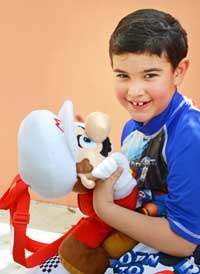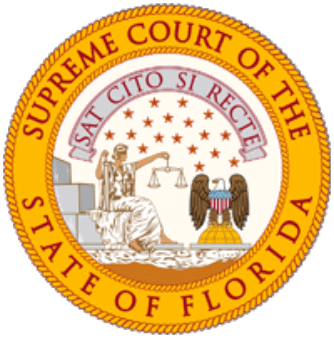
At 18 months of age, Karls Gonzalez seemed like any other happy toddler. He would return his mother’s smile, had a budding vocabulary that included words like “mama,” “papa,” and “cookies” and had developed a healthy appetite for solid food.
But by the time he turned 2, he had become a different child. He stopped speaking and making eye contact. He refused any food that was not pureed. At the playground he would just walk in circles, staring at his own shadow or at the wall. He never climbed on the equipment or interacted with other kids.
“He was like a little old man,” said his mother Iliana Gonzalez, tears welling as she recalled her son’s extreme detachment.
Gonzalez soon learned that Karls had regressive autism, a form of the disorder that often becomes apparent by a child’s second birthday. Karls not only stopped engaging with those around him, but also became aggressive. As he grew older, his mother’s arms became covered in bruises and bite marks from his frequent outbursts.
After three years of speech, physical, and occupational therapy, which were covered by Florida Medicaid, Karls showed no improvement. Having talked with his neurologist and other experts and done a lot of her own research, Gonzalez knew that the therapy Karls really needed was Applied Behavior Analysis (ABA), a widely recognized, intensive treatment for autism that uses techniques such as positive reinforcement to influence behavior. But there was one problem. Medicaid did not cover it, and on her husband’s salary, the family had no way to afford it.
Karls’ situation changed, however, after a social worker from Baptist Children’s Hospital in Miami referred Gonzalez to legal aid.
Since Jan. 30, Karls, now 6, has been receiving ABA therapy thanks to his attorneys at Legal Services of Greater Miami (LSGMI), Florida Legal Services (FLS) and the Miami law firm of Alderman & Kodsi. His legal team was able to secure Medicaid coverage for the therapy after a preliminary injunction order, and on March 26 U.S. District Judge Joan Lenard issued a permanent injunction ordering the state of Florida to begin providing coverage of ABA for all children on Medicaid diagnosed with an autism spectrum disorder.
“The Medicaid population of children diagnosed with autism and/or autism spectrum disorder are deserving and will be given ABA treatment in the state of Florida,” said Lenard in an oral order from the bench. Following a four-day trial, she referred to the case as one of the most important she had ever heard. Lenard’s ruling took effect immediately, and the new policy and necessary forms have been made available on the website of the Agency for Health Care Administration.
LSGMI attorney Monica Vigues-Pitan worked on the federal case with lead attorney Miriam Harmatz in the FLS Miami office and private attorney Neil Kodsi, whose trial expertise was critical. They also had help from co-counsel Betsy Havens, an Equal Justice Works (EJW) Fellow who also holds a master’s in public health, and whose fellowship at FLS is supported by The Florida Bar Foundation and the law firm of Greenberg Traurig.
While state law has required private insurers to cover ABA therapy for autistic children since 2008, Florida’s Medicaid program had continued to deny coverage by claiming, among other things, that the therapy was “experimental.” The plaintiffs’ rebuttal expert cited an abundance of scientific literature that thoroughly undermined the state’s claim.

“Judge Lenard’s order will eliminate the tragic disparity between the prognosis of privately insured children with autism, who receive ABA, and those on Medicaid, who do not,” said Harmatz, one of the state’s leading Medicaid advocates. “This case will have national impact because, while most states mandate that private insurance companies cover ABA, most Medicaid programs do not provide coverage.”
Autism advocates pointed out at trial that ABA therapy will provide autistic children the help they need to lead productive lives and not be dependent on the state through more costly group homes.
“This order will save thousands of other Florida children from being unnecessarily and permanently disabled,” said Vigues-Pitan. “And while the intensive therapy can be costly, the evidence also established that providing ABA for Karls and other children like him will ultimately save significant public funds.”
The Agency for Health Care Administration has said it will appeal the ruling.
Karls was one of three autistic Miami children on whose behalf the case was brought, but the outcome has made more than 8,000 children currently in the Florida Medicaid program eligible for ABA therapy. Meanwhile, Karls has undergone a remarkable transformation after less than five months of ABA therapy.
“Hello. How are you?” he asks upon meeting someone for the first time. Although his words sound rehearsed, a bit like a foreign language student, he speaks with a sunny confidence and looks his new acquaintance in the eye.
“Say cheese!” he calls out, as he flashes his best Hollywood smile at a stranger pointing a camera his way.
Karls has also stopped hitting and biting and instead started participating in all kinds of activities that would have been unthinkable before. He teaches himself sign language on the computer and has learned how to count to 10 in several languages. He will sit still and pay attention to his speech therapist, enabling him to benefit from a form of therapy that had been wasted on him before. He can understand games like tag, can toss a ball to someone, and will approach other children with interest in what they are doing.
Gonzalez said even Karls’ neurologist has found his new behaviors remarkable for a child with such a severe form of autism.
“Before, you could call him, ‘Karls, Karls!’ and you were talking to the air,” she said. “Now I am seeing the child I lost. He is bigger. He is older. But he is the child I lost.”
FLS and LSGMI both receive general support grants from The Florida Bar Foundation that enable their staff attorneys to devote the tremendous amount of time needed to pursue such landmark cases.
“This is our legal services community at its best – a very needy client, a local legal aid attorney, an expert attorney from a statewide legal aid program, a new EJW attorney and a pro bono private attorney,” said Florida Legal Services Executive Director Kent Spuhler.
Gonzalez said she thanks God for meeting the social worker who referred her to legal aid.
“A lot of kids need this, not just Karls,” she said. “There are kids who can take advantage of this from a much younger age, and it will help them even more.”




